GALLUP NEWS SERVICE
PRINCETON, NJ -- With gas prices rising to their highest level ever in the United States, 56% of Americans say that means they will drive less this summer, according to a recent CNN/USA Today/Gallup survey. About half of all Americans also say they have already suffered some hardship because of the higher prices, while about 6 in 10 expect to suffer hardship this summer. But the public is divided about whether the higher prices are a temporary fluctuation or a more permanent change.
The poll, conducted May 21-23, finds that lower-income Americans are more likely to say they will be driving less this summer than are higher-income Americans -- 64% of those earning less than $30,000 a year will cut back, compared with 47% of those earning $75,000 or more.
| Will the Price of Gas Cause You to Drive Less
Than You Might Have Otherwise This Summer? percentage saying “yes” by income |
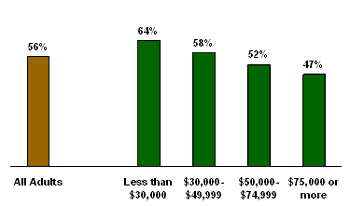 |
| May 21-23, 2004 |
Three years ago, in May 2001, a similar number of Americans (58%) said they expected to cut back on summer driving because of gas prices. A May 2000 poll found only 41% expecting to cut back on summer driving because of gas prices, though a month later, in June, 50% expressed that view.
Higher Gas Prices Cause Financial Hardship
According to the current poll, 47% of Americans say that recent gas prices have already caused them financial hardship, while 59% expect that higher gas prices will cause them financial hardship this summer. These views are highly related to household income.
| Gas Prices Causing Financial Hardship: Now Versus This Summer percentage saying “yes” by income |
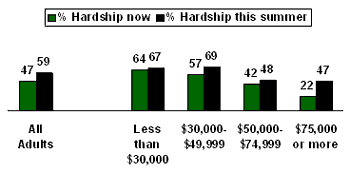 |
| May 21-23, 2004 |
The lowest-income Americans are already feeling the pinch of higher gas prices, while many higher-income Americans expect to feel it when summer arrives. Even among those with household incomes of $75,000 or more, close to half (47%) expect gas prices to take their financial toll then.
Americans are divided over whether recent increases in gas prices represent a temporary fluctuation (48%) or a more permanent change (50%).
| Gas Prices – Temporary Fluctuation
or Permanent Change? |
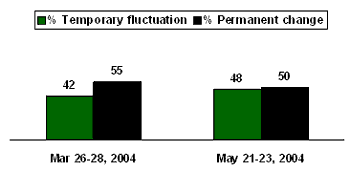 |
These views are somewhat more optimistic now than they were two months ago, when a March 26-28 poll found 42% of Americans saying the price increases would be temporary, and 55% saying permanent. The change could be the result of news reports that the Saudis say they will increase their production of oil.
Reasons for Higher Prices
There is no widespread consensus as to why gas prices have risen. Twenty-two percent of Americans speculate that oil companies/big businesses want higher profits and 19% cite the war in Iraq, 9% say OPEC or Saudi Arabia is manipulating the oil supply, 8% attribute the increase to simple supply and demand, and 7% say it's politics.
Just your opinion, why would you say the price of gasoline has been rising so much in recent months?
|
Overall |
Approve |
Disapprove |
|
|
% |
% |
% |
|
|
Big business/oil companies/price gouging/refineries wanting more profit |
22 |
24 |
21 |
|
The war in Iraq |
19 |
13 |
24 |
|
OPEC/Saudi Arabia manipulating supply |
9 |
13 |
7 |
|
Supply and demand |
8 |
8 |
8 |
|
Government/politics |
7 |
6 |
8 |
|
President Bush |
5 |
3 |
8 |
|
Lack of U.S. refining capability/lack of supply/drilling |
4 |
6 |
4 |
|
Gas shortage/lack of production |
4 |
5 |
3 |
|
Unrest in the Middle East |
4 |
4 |
4 |
|
Economy/inflation |
2 |
1 |
3 |
|
Summer vacation time/prices always go up around this time |
2 |
3 |
1 |
|
Foreign policy |
1 |
1 |
* |
|
Other |
6 |
8 |
4 |
|
No opinion |
15 |
14 |
14 |
|
*Less than 0.5% |
Some of the reasons offered for the gas price increase are highly related to one's partisan orientation, as reflected in approval or disapproval of George W. Bush's job performance. Bush supporters are less likely to mention the war in Iraq as a cause (13%) than are people who disapprove of Bush (24%). Similarly, Bush supporters are less likely to say the president is the cause (3%) than are those who disapprove of him (8%).
Gas Prices a Highly Partisan Issue
Perceptions of whether price increases are temporary or permanent are also highly related to partisanship. People who approve of Bush say the prices are temporary, by a 58% to 41% margin. Those who disapprove say the prices are permanent, by a 57% to 41% margin.
| Persistence of Gas Prices -- Compared by Bush’s Job Approval Rating |
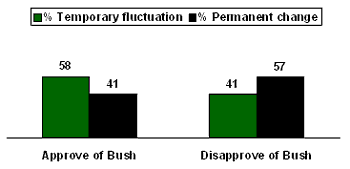 |
| May 21-23, 2004 |
Similarly, reports of current or expected financial hardship, and a cutback on summer driving are all related to Bush's job rating. For each issue, people who approve of the president are more likely than those who disapprove to express more optimistic views about the effect of the gas price increases.
| Effect of Gas Prices Compared by Bush’s Job Approval Rating |
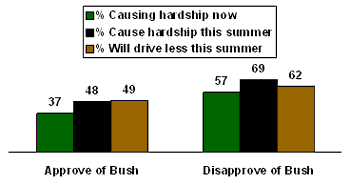 |
| May 21-23, 2004 |
To some degree, the disparity in views between those who approve and those who disapprove of Bush reflects the different economic levels of Republicans and Democrats. Republicans tend to have higher incomes than Democrats do and income is associated with views about the effects of gasoline prices. But the data suggest that partisanship is also an independent factor in these views, beyond just the income differences.
Methodology
Results are base on telephone interviews with 1,002 national adults, aged 18 and older, conducted May 21-23, 2004. For results based on the total sample of national adults, one can say with 95% confidence that the margin of sampling error is ±3 percentage points.
In addition to sampling error, question wording and practical difficulties in conducting surveys can introduce error or bias into the findings of public opinion polls.
17. Now, thinking about the cost of gasoline, do you think the current rise in gas prices represents – [ROTATED: a temporary fluctuation in prices, or a more permanent change in prices]?
BASED ON –496—NATIONAL ADULTS IN FORM B
|
Temporary |
More permanent |
No opinion |
||
|
% |
% |
% |
||
|
2004 May 21-23 ^ |
48 |
50 |
2 |
|
|
2004 Mar 26-28 ^ |
42 |
55 |
3 |
|
|
2003 Aug 25-26 |
65 |
33 |
2 |
|
|
2003 Feb 17-19 ^ |
62 |
36 |
2 |
|
|
2001 May 7-9 ^ |
40 |
56 |
4 |
|
|
2000 Jun 22-25 ^ |
57 |
39 |
4 |
|
|
2000 May 23-24 ^ |
45 |
50 |
5 |
|
|
2000 Mar 30-Apr 2 ^ |
60 |
37 |
3 |
|
|
2000 Mar 10-12 ^ |
63 |
34 |
3 |
|
|
^ |
Asked of a half sample. |
|||
Q.18-19 SPLIT SAMPLED
18. Have recent price increases in gasoline caused any financial hardship for you or your household?
BASED ON –506—NATIONAL ADULTS IN FORM A
|
Yes, |
No, has not |
No |
||
|
% |
% |
% |
||
|
2004 May 21-23 ^ |
47 |
52 |
1 |
|
|
2004 Mar 26-28 ^ |
47 |
53 |
* |
|
|
2003 Feb 17-19 |
35 |
65 |
* |
|
|
2001 May 7-9 |
47 |
53 |
* |
|
|
2000 Jun 22-25 |
44 |
56 |
* |
|
|
2000 May 23-24 |
36 |
64 |
* |
|
|
2000 Mar 30-Apr 2 |
39 |
61 |
* |
|
|
2000 Mar 10-12 |
41 |
59 |
* |
|
|
2000 Feb 14-15 † |
40 |
60 |
* |
|
|
^ |
Asked of a half sample. |
|||
|
† |
WORDING: Have recent price increases in gasoline, diesel fuel and home fuel oil caused any financial hardship for you or your household? |
|||
19. Do you expect that price increases in gasoline will – or will not – cause any financial hardship for you and your household this summer?
BASED ON –496—NATIONAL ADULTS IN FORM B
|
Yes, will |
No, will not |
No opinion |
||
|
2004 May 21-23 ^ |
59% |
39 |
2 |
|
|
2004 Mar 26-28 ^ |
58% |
42 |
* |
|
|
^ |
Asked of a half sample. |
|||
20. Will the price of gas cause you to drive less than you might have otherwise this summer, or not?
|
Yes |
No |
No opinion |
|
|
% |
% |
% |
|
|
2004 May 21-23 |
56 |
43 |
1 |
|
2001 May 7-9 |
58 |
41 |
1 |
|
2000 Jun 22-25 |
50 |
49 |
1 |
|
2000 May 23-24 |
41 |
57 |
2 |
21. Just your opinion, why would you say the price of gasoline has been rising so much in recent months? [OPEN-ENDED]
|
2004 May 21-23 |
|
|
% |
|
|
Big business/oil companies/price gouging/refineries wanting more profit |
22 |
|
The war in Iraq |
19 |
|
OPEC/Saudi Arabia manipulating supply |
9 |
|
Supply and demand |
8 |
|
Government/politics |
7 |
|
President Bush |
5 |
|
Lack of U.S. refining capability/lack of supply/drilling |
4 |
|
Gas shortage/lack of production |
4 |
|
Unrest in the Middle East |
4 |
|
Economy/inflation |
2 |
|
Summer vacation time/prices always go up around this time |
2 |
|
Foreign policy |
1 |
|
Other |
6 |
|
No opinion |
15 |
|
Total |
108% |

